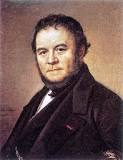The Red and the Black Page #10
Le Rouge et le Noir is a historical psychological novel in two volumes by Stendhal, published in 1830. It chronicles the attempts of a provincial young man to rise socially beyond his modest upbringing through a combination of talent, hard work, deception, and hypocrisy.
In the meanwhile the Justice of the Peace, who was the father of a numerous family, gave several sentences which seemed unjust: all these sentences were inflicted on those of the inhabitants who read the "Constitutionnel." The right party triumphed. It is true it was only a question of sums of three or five francs, but one of these little fines had to be paid by a nail-maker, who was god-father to Julien. This man exclaimed in his anger "What a change! and to think that for more than twenty years the Justice of the Peace has passed for an honest man." The Surgeon-Major, Julien's friend, died. Suddenly Julien left off talking about Napoleon. He announced his intention of becoming a priest, and was always to be seen in his father's workshop occupied in learning by heart the Latin Bible which the curé had lent him. The good old man was astonished at his progress, and passed whole evenings in teaching him theology. In his society Julien did not manifest other than pious sentiments. Who could not possibly guess that beneath this girlish face, so pale and so sweet, lurked the unbreakable resolution to risk a thousand deaths rather than fail to make his fortune. Making his fortune primarily meant to Julien getting out of Verrières: he abhorred his native country; everything that he saw there froze his imagination. He had had moments of exultation since his earliest childhood. He would then dream with gusto of being presented one day to the pretty women of Paris. He would manage to attract their attention by some dazzling feat: why should he not be loved by one of them just as Buonaparte, when still poor, had been loved by the brilliant Madame de Beauharnais. For many years past Julien had scarcely passed a single year of his life without reminding himself that Buonaparte, the obscure and penniless lieutenant, had made himself master of the whole world by the power of his sword. This idea consoled him for his misfortune, which he considered to be great, and rendered such joyful moments as he had doubly intense. The building of the church and the sentences pronounced by the Justice of the Peace suddenly enlightened him. An idea came to him which made him almost mad for some weeks, and finally took complete possession of him with all the magic that a first idea possesses for a passionate soul which believes that it is original. "At the time when Buonaparte got himself talked about, France was frightened of being invaded; military distinction was necessary and fashionable. Nowadays, one sees priests of forty with salaries of 100,000 francs, that is to say, three times as much as Napoleon's famous generals of a division. They need persons to assist them. Look at that Justice of the Peace, such a good sort and such an honest man up to the present and so old too; he sacrifices his honour through the fear of incurring the displeasure of a young vicar of thirty. I must be a priest." On one occasion, in the middle of his new-found piety (he had already been studying theology for two years), he was betrayed by a sudden burst of fire which consumed his soul. It was at M. Chélan's. The good curé had invited him to a dinner of priests, and he actually let himself praise Napoleon with enthusiasm. He bound his right arm over his breast, pretending that he had dislocated it in moving a trunk of a pine-tree and carried it for two months in that painful position. After this painful penance, he forgave himself. This is the young man of eighteen with a puny physique, and scarcely looking more than seventeen at the outside, who entered the magnificent church of Verrières carrying a little parcel under his arm. He found it gloomy and deserted. All the transepts in the building had been covered with crimson cloth in celebration of a feast. The result was that the sun's rays produced an effect of dazzling light of the most impressive and religious character. Julien shuddered. Finding himself alone in the church, he established himself in the pew which had the most magnificent appearance. It bore the arms of M. de Rênal. Julien noticed a piece of printed paper spread out on the stool, which was apparently intended to be read, he cast his eyes over it and saw:--"Details of the execution and the last moments of Louis Jenrel, executed at Besançon the...." The paper was torn. The two first words of a line were legible on the back, they were, "The First Step." "Who could have put this paper there?" said Julien. "Poor fellow!" he added with a sigh, "the last syllable of his name is the same as mine," and he crumpled up the paper. As he left, Julien thought he saw blood near the Host, it was holy water which the priests had been sprinkling on it, the reflection of the red curtains which covered the windows made it look like blood. Finally, Julien felt ashamed of his secret terror. "Am I going to play the coward," he said to himself: "To Arms!" This phrase, repeated so often in the old Surgeon-Major's battle stories, symbolized heroism to Julien. He got up rapidly and walked to M. de Rênal's house. As soon as he saw it twenty yards in front of him he was seized, in spite of his fine resolution, with an overwhelming timidity. The iron grill was open. He thought it was magnificent. He had to go inside. Julien was not the only person whose heart was troubled by his arrival in the house. The extreme timidity of Madame de Rênal was fluttered when she thought of this stranger whose functions would necessitate his coming between her and her children. She was accustomed to seeing her sons sleep in her own room. She had shed many tears that morning, when she had seen their beds carried into the apartment intended for the tutor. It was in vain that she asked her husband to have the bed of Stanislas-Xavier, the youngest, carried back into her room. Womanly delicacy was carried in Madame de Rênal to the point of excess. She conjured up in her imagination the most disagreeable personage, who was coarse, badly groomed and encharged with the duty of scolding her children simply because he happened to know Latin, and only too ready to flog her sons for their ignorance of that barbarous language. [1] The author was sub-lieutenant in the 6th Dragoons in 1800. CHAPTER VI ENNUI Non so piú cosa son Cosa facio. MOZART (Figaro). Madame de Rênal was going out of the salon by the folding window which opened on to the garden with that vivacity and grace which was natural to her when she was free from human observation, when she noticed a young peasant near the entrance gate. He was still almost a child, extremely pale, and looked as though he had been crying. He was in a white shirt and had under his arm a perfectly new suit of violet frieze. The little peasant's complexion was so white and his eyes were so soft, that Madame de Rênal's somewhat romantic spirit thought at first that it might be a young girl in disguise, who had come to ask some favour of the M. the Mayor. She took pity on this poor creature, who had stopped at the entrance of the door, and who apparently did not dare to raise its hand to the bell. Madame de Rênal approached, forgetting for the moment the bitter chagrin occasioned by the tutor's arrival. Julien, who was turned towards the gate, did not see her advance. He trembled when a soft voice said quite close to his ear:
Translation
Translate and read this book in other languages:
Select another language:
- - Select -
- 简体中文 (Chinese - Simplified)
- 繁體中文 (Chinese - Traditional)
- Español (Spanish)
- Esperanto (Esperanto)
- 日本語 (Japanese)
- Português (Portuguese)
- Deutsch (German)
- العربية (Arabic)
- Français (French)
- Русский (Russian)
- ಕನ್ನಡ (Kannada)
- 한국어 (Korean)
- עברית (Hebrew)
- Gaeilge (Irish)
- Українська (Ukrainian)
- اردو (Urdu)
- Magyar (Hungarian)
- मानक हिन्दी (Hindi)
- Indonesia (Indonesian)
- Italiano (Italian)
- தமிழ் (Tamil)
- Türkçe (Turkish)
- తెలుగు (Telugu)
- ภาษาไทย (Thai)
- Tiếng Việt (Vietnamese)
- Čeština (Czech)
- Polski (Polish)
- Bahasa Indonesia (Indonesian)
- Românește (Romanian)
- Nederlands (Dutch)
- Ελληνικά (Greek)
- Latinum (Latin)
- Svenska (Swedish)
- Dansk (Danish)
- Suomi (Finnish)
- فارسی (Persian)
- ייִדיש (Yiddish)
- հայերեն (Armenian)
- Norsk (Norwegian)
- English (English)
Citation
Use the citation below to add this book to your bibliography:
Style:MLAChicagoAPA
"The Red and the Black Books." Literature.com. STANDS4 LLC, 2025. Web. 8 Mar. 2025. <https://www.literature.com/book/the_red_and_the_black_201>.








Discuss this The Red and the Black book with the community:
Report Comment
We're doing our best to make sure our content is useful, accurate and safe.
If by any chance you spot an inappropriate comment while navigating through our website please use this form to let us know, and we'll take care of it shortly.
Attachment
You need to be logged in to favorite.
Log In